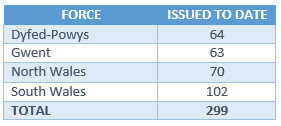30 Apr 2020
Update: Latest Covid-19 FPN data, and news about police recruitment drive
Official figures released today (30 April) by the Home Office show that police forces in England and Wales have been boosted by 3,005 new officers in the last seven months. Provisional figures also show widespread continued compliance with public health regulations and minimal police enforcement.
The additional officers have been brought in as part of the Government’s ‘Join the Police’ campaign, which launched in September.
The recruitment figures come at the same time as the College of Policing revealed innovative steps being taken to ensure that recruitment continues despite the coronavirus outbreak.
Measures being introduced by the College of Policing include guidance on essential biometric vetting for new recruits as well as news that forces will soon be able to request an online assessment centre which will replace the need for face-to-face contact with candidates.
National Police Chiefs Council (NPCC) Chair Martin Hewitt, said:
“With over 3,000 additional officers already joining policing in the past seven months, we are well on our way to meeting our target of 6,000 by March next year.
“Working with the Home Office, we are making every effort to keep recruitment of officers going despite all the challenges coronavirus brings. Creative solutions from the College of Policing will help to ensure this momentum is not lost and that recruitment and training can continue during the pandemic
“Our new recruits have joined at an extraordinary time for us all, in the midst of an unprecedented public health emergency, where on top of their core duties they are supporting a national effort to help doctors, nurses and other healthcare workers to fight this virus and save lives.
“Their recruitment – and that of future recruits – will enable us to provide an even better service to the public and reduce crime.”
Data also released today shows that 8,877 Fixed Penalty Notices (FPNs) have been recorded by forces in England up to 27 April for breaches of government public health regulations. In Wales, 299 FPNs have been issued in the same timeframe.
Government public health regulations introduced on 27 March 2020 to prevent the spread of coronavirus enable officers to issue individuals with £60 fines if they failed to comply after officers have engaged with them, explained the risks to public health and encouraged voluntary compliance.
NPCC Chair Martin Hewitt said:
“As the latest provisional figures on the number of fines issued show, the vast majority of people continue to do the right thing, staying at home in order to protect the NHS and help save lives.
“The figures also show our use of the enforcement powers remains proportionate with just 0.02 per cent of the population in England being issued with a fine
“I want to thank people for continuing to follow the regulations – I recognise it’s not easy and that this is a challenging time for us all.
“Our approach of – engage, explain and encourage, and only as a last resort, enforce –will continue. It is working.
“I urge the public to keep going, keep following the advice: stay home, protect the NHS and save lives.”
Further Information
FPN Data
Data on Fixed Penalty Notices issued under government public health regulations from police forces in England and Wales is being published fortnightly to provide transparency in how the regulations are being policed.
The data is based on police force submissions to ACRO (National Criminal Records Office). Forces have had to adapt to the new system at pace and the speed of processing and submissions to ACRO differ across forces. The latest figures include revisions to the data previously released for the period from 27 March to 13 April following further submissions from forces.
Notices may have been issued by forces, but not yet received by ACRO.
The dataset covers the period Friday 27 March to Monday 27 April.
The data is not subject to same stringent analysis and quality assurance that is possible with an established official statistics collection; however it is indicative of trends and provides a guide to how police forces are using new regulations.
Caution should be used in comparing data between forces, due to differences in processing times and force context which can be explained by police forces.
Demographics of persons issued with notices:
Data supplied by forces in England and data supplied by forces in Wales have been analysed separately.
82 per cent of fines in England were given to men, and 15 per cent to women, with three per cent unknown. 36 per cent of fines were issued to those aged 18-24, with 31 per cent going to those aged 25-34.
58 per cent of fines in England were issued to those self-identifying as White. With 25 per cent of fines issued to individuals who did not self-identify their ethnicity. Fines to those of Asian ethnicity stood at 10 per cent, Black at four per cent, and Mixed Race at two per cent.
76 per cent of fines in Wales were given to men, and 24 per cent to women. 40 per cent of fines went to those aged 18-24, with 28 per cent to those aged 25-34.
75 per cent of fines in Wales were issued to those self-identifying as White. With 16 per cent of fines issued to individuals who did not self-identify their ethnicity. Fines to those of Asian ethnicity stood at five per cent, Black at two per cent, and Mixed Race at two per cent.
Data tables for England, BTP and MoD Police
Table 1: Fixed Penalty Notices (FPNs) issued by territorial forces in England (and BTP), under emergency health regulations.
FPNs related to the enforcement of the new COVID-19 public health regulations
Data table for Welsh forces
Contact information
Communications office
By phone: 0800 538 5058
By email: press.office@npcc.police.uk






